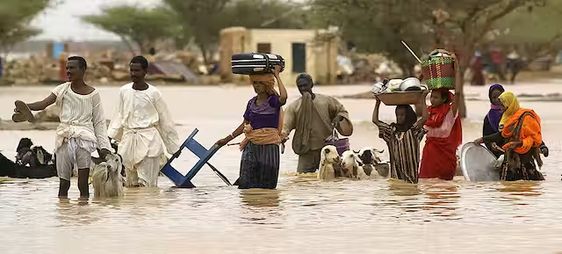Saturday, October 19, 2024
Sudan's War Induced Balkanization
Friday, September 20, 2024
South Sudanese Elections Are Postponed
Thursday, July 18, 2024
Paul Kagame Retains The Rwandan Presidency
Saturday, June 29, 2024
The Kenya Tax Protests
Saturday, January 6, 2024
The Somaliland Port Agreement Dispute
Tuesday, October 10, 2023
South Sudan Declares Independence (2011)
Friday, September 22, 2023
Paul Kagame Seeking A Fourth Term
Sunday, April 16, 2023
The Rapid Support Forces Revolt In Sudan
Wednesday, November 9, 2022
Ethiopia Opens Peace Talks With The TPLF
Tuesday, September 6, 2022
Flooding On The Rise In Sudan
Seasonal floods have occurred in Sudan. This has been common with the rising waters that come from Nile River. The concern is the growing intensity of the floods. Rain fall and water levels are being altered by climate change. The increase in sea levels means flooding in costal areas. Sudan is not the only African country to struggle with floods. Uganda has seen some damage from rising waters. If too much rainfall happens this can cause landslides. When flooding stops, there are also devastating consequences. Homelessness and damage to infrastructure are major challenges. The death from flooding becomes more disturbing as governments show they have limited ability to save lives. Practical solutions do exist. Ditches, canals, and culverts must be expanded in Sudan. Infrastructure and other buildings should be as far away from at risk areas. An emergency evacuation plan should be established to ensure public safety. A climate change management policy must be developed b the African Union to ensure the preservation of East Africa. The intensification of floods also comes at a time when drought is happening in certain areas of the region.
Tuesday, July 5, 2022
Uganda Discovers An Estimated $12 Trillion Worth of Gold Deposits
Uganda has the potential to be one of Africa's richest nations. Gold deposits worth $ 12 trillion have been discovered. Combined with oil Uganda is in a position to see impressive economic growth in the coming years. What should be done with the new found wealth is that it goes to public education, healthcare, and infrastructure development. Doing so ensures a stable country and a rise in the standard of living. The persistent economic myth is that Africa is poor. African countries are not poor, rather their wealth has been stolen or their countries exploited by European nations. Corrupt and authoritarian regimes use wealth to empower themselves, rather than the citizens. Inflation is having a negative effect on the global economy and Uganda is not shielded from it. The Ugandan Central Bank had to increase its key interest rate. The public has to see economic improvement to share in the new found wealth. The boom in mining is positive economic news for East Africa. The Ugandan shilling could go up in value if it becomes backed by gold. Extracting the full potential of natural resources can ensure a prosperous country. The key is to have rational policies and competent economic management.
Monday, October 25, 2021
Sudan Has Fallen To A Military Coup
After months of protests, another military coup has occurred in Sudan. Previous attempts were made to depose the civilian government, but were thwarted. The transitional government has been dissolved and a state of emergency declared. The ruling military junta has promised elections for 2023. Prime Minister Abdalla Homdok is being detained. Prime Minister Homdok failed to address the growing discord of the population exhausted from the major changes that came with the fall of Omar al-Bashir. Two years have passed since the fall of the regime, but stability and democratization has remained elusive. The Sudanese public has reacted with more demonstrations being held in various cities. Concerned citizens took to the streets in both Khartoum and Omdurman. A large source of contention was the issue of handing over Omar al-Bashir to the International Crimes Court. This split the Sovereign Council The economic conditions have become worse. Inflation and the lack of certain goods was not being fully addressed by Prime Minister Homdok. Even with foreign aid, this has not produced dramatic improvements. The African Union, United Nations, and Arab League have expressed opposition to the political developments. Homdok's removal was a combination of rebel groups and political parties working with the military. Sudan's challenge is like Algeria, Nigeria, and Egypt. The military is an obstacle to political change. Other African nations are dealing with military take overs such as Mali and Guinea. The African continent is seeing an increase in military coups over the past three years.
Tuesday, July 21, 2020
Omar al-Bashir Will Be Charged For The 1989 Coup
 |
| Bashir waves to supporters in a rally in 1989. |












